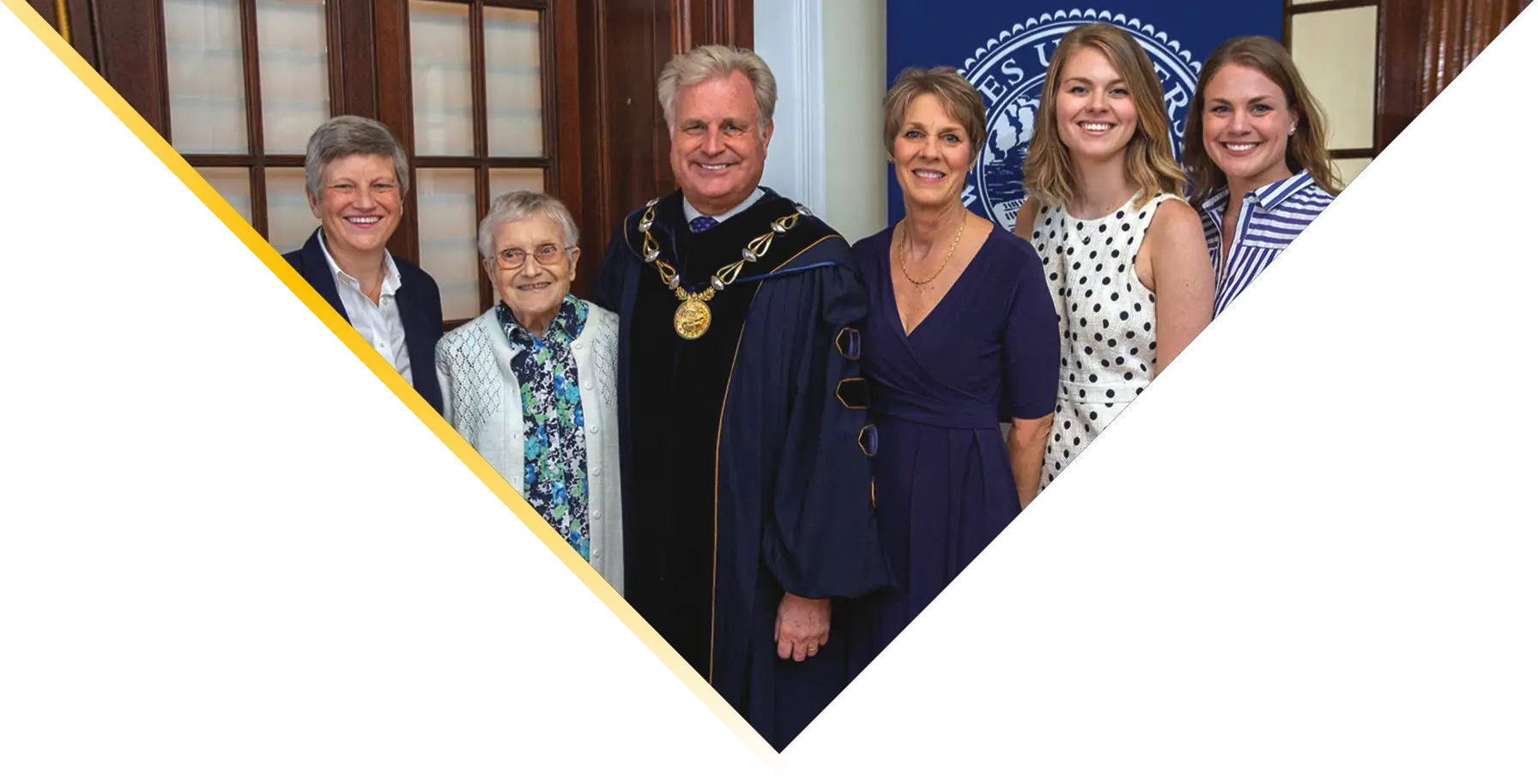
Loyal to the End
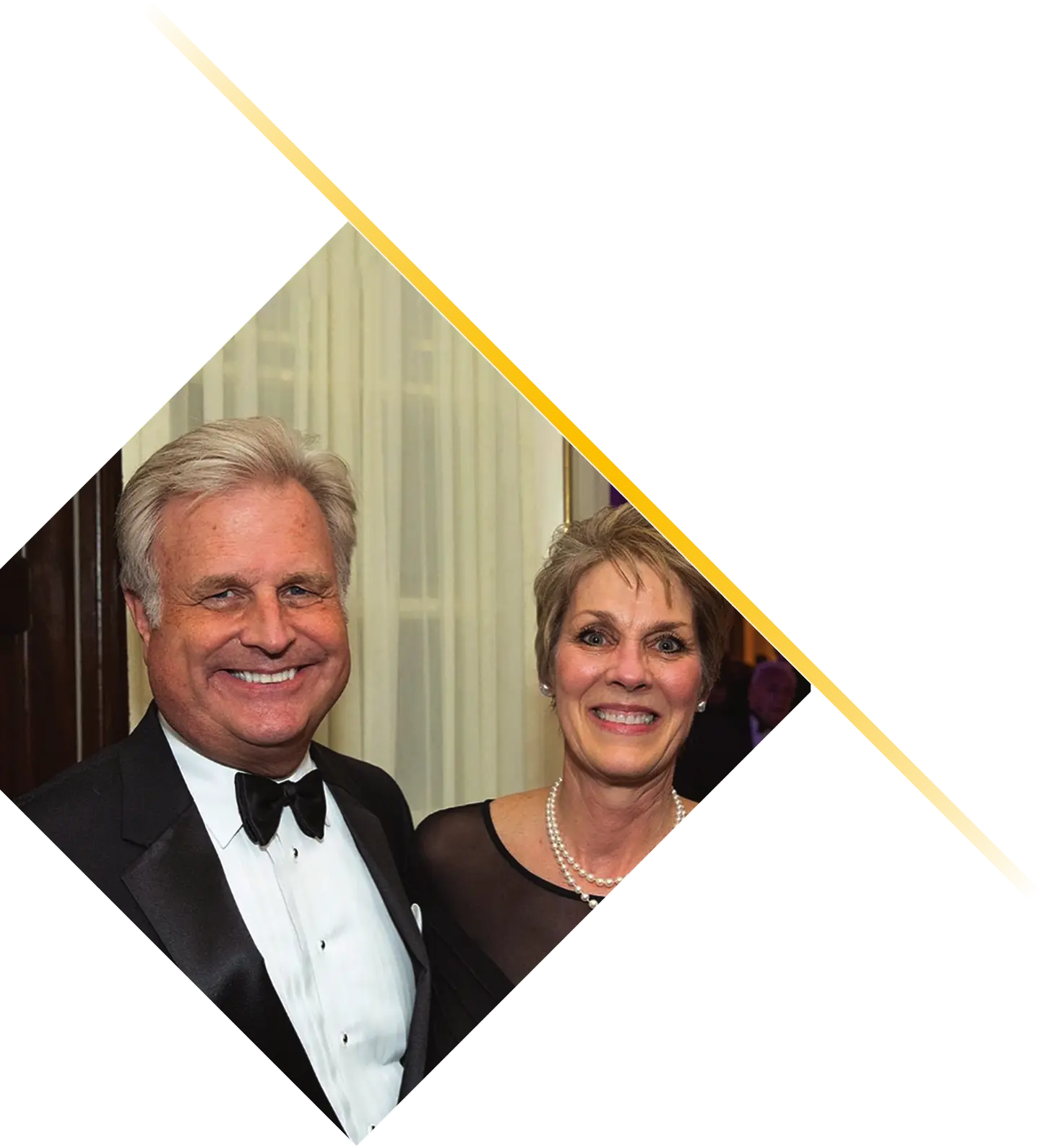
Top right, from left: Nancy Adams, Doris Adams, Paul and Jean Adams, daughters Caroline and Lindsay.
Right: The Pickering Hall and New Men’s Dorm, circa 1967.
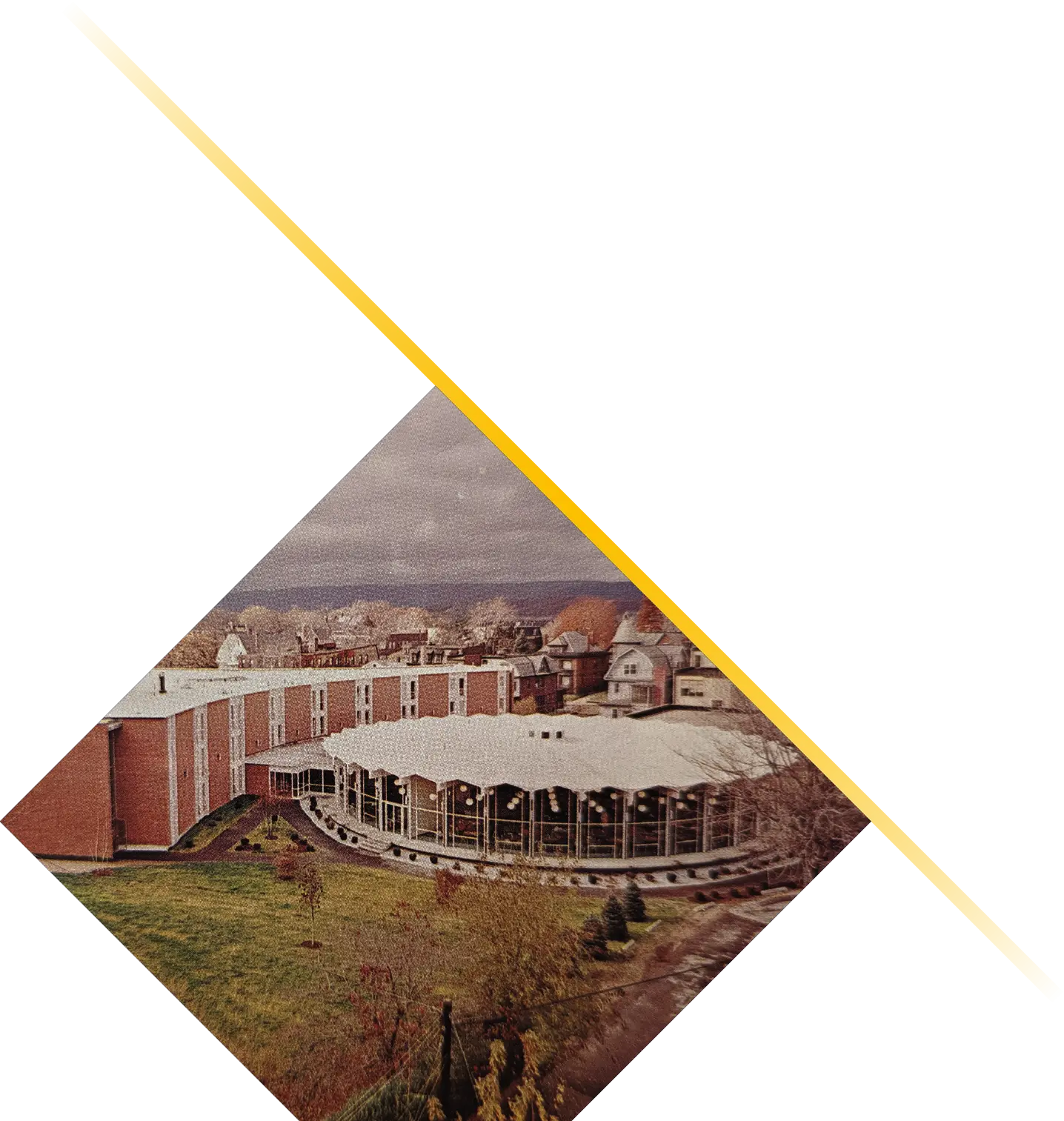

The son of a Methodist minister, Adams had learned about Wilkes when his father was assigned to a church in Forty Fort, Pa., during the 1960s. It was the era of the college’s legendary Golden Horde football team and Adams—a self-described “sports nut” during his childhood—became a fan. When the time came for college, Adams, who played high school football, chose Wilkes with thoughts of continuing to play.
“I never really found my intellectual curiosity when I was in high school, so I wasn’t a great student,” Adams recalls. “And as the story was with so many young people, Wilkes took a chance on me and gave me an opportunity.”
Like the man who hired him, Adams has shaped the student experience at Wilkes for decades, becoming the administrator synonymous with the institution for generations of graduates. He served as director of residence life for seven years before becoming associate dean of student affairs. Other positions as dean of academic support services, student affairs and University College followed. He became vice president for student affairs in 2004—a position he held until his retirement in August 2022.
His tenure as vice president was interrupted when he served as interim president of the University in fall 2019. It fell to him to shepherd Wilkes through the challenges of the COVID-19 pandemic. His memorable messages to the campus during the time helped to maintain morale.
Adams, who frequently referenced the words of the Wilkes alma mater in his pandemic communications (“Honor, faith and courage, truth and loyalty”), ended his career heeding the song’s dictum—“loyal to the end.” He sat down with Wilkes magazine to talk about his years at the University.
To me, what transcends across all the generations of students who have attended Wilkes is the power of relationships to enhance learning. It is the power of relationships between students and faculty and the faculty’s ability to take students beyond their own self-perceived potential. To me, that’s the beauty of Wilkes. I am hoping that culture continues.
Young people continue to enter Wilkes with the same developmental tasks that they need to accomplish during their undergraduate years. They still need to learn to manage their emotions. They need to establish their identity. They need to figure out their purpose in life. What is their vocational aspiration? They need to assess where they see themselves fitting into society and making a life for themselves. During their time at Wilkes, they are figuring out their values as they meet new people. I would say that those are the things that continue to be part of late adolescent life today that were also part of it back then when I came to Wilkes.
One of the things that is very different at Wilkes today is the makeup of the student body. It’s more diverse and comes from a wider geographic area. Back when I was in school, and through the early 80s, there were more commuter students than residence hall students. There weren’t as many students living off campus as there are today. Anybody who came from out of town lived on campus. That’s a major difference. And of course, another major change for students moving into the residence halls today is connecting to the internet. They walk in and the first thing they ask is, “How do I get online?”
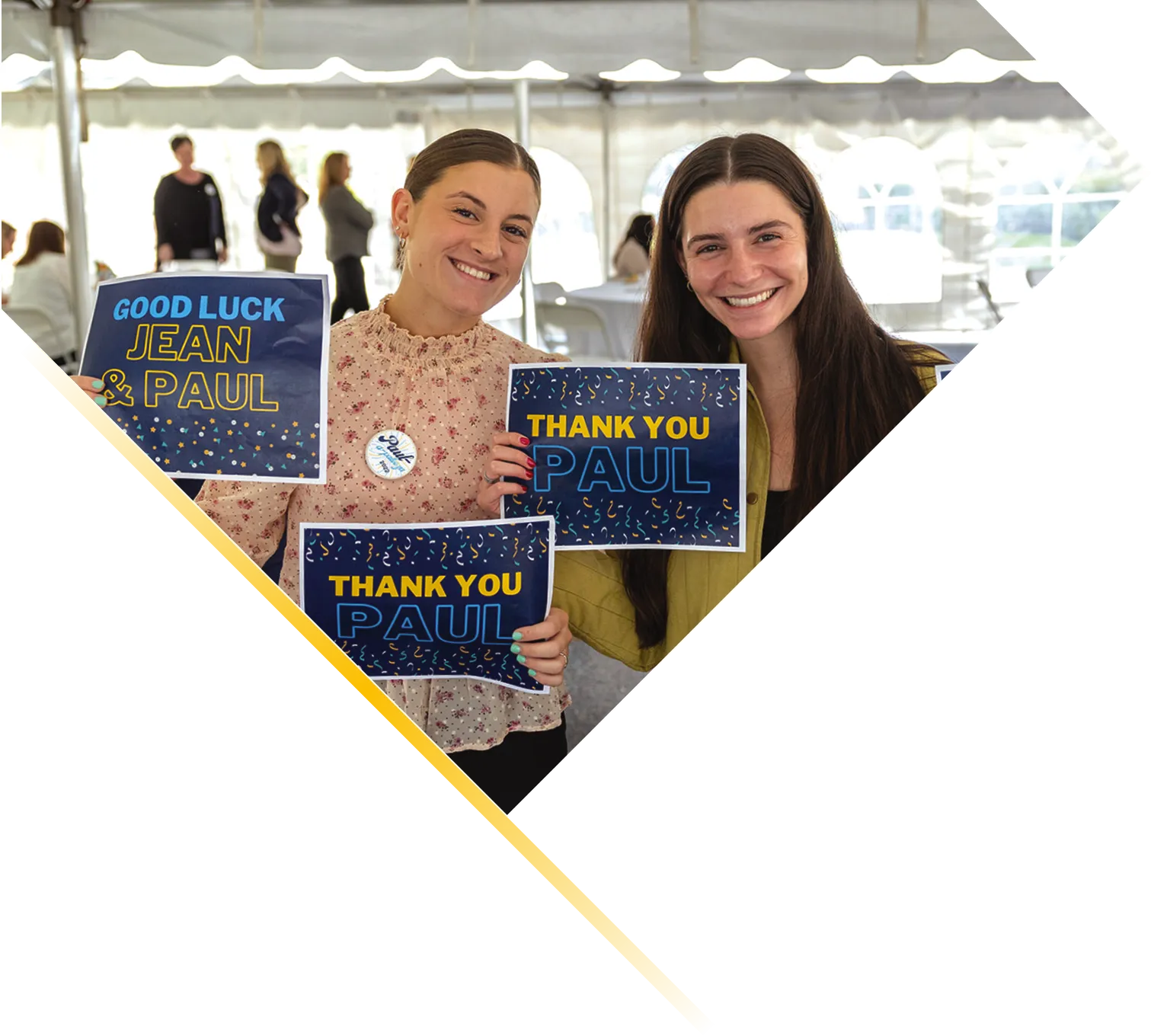
Left: Jean and Paul Adams began their careers at Wilkes in the office of residence life, in 1980 and 1979, respectively.
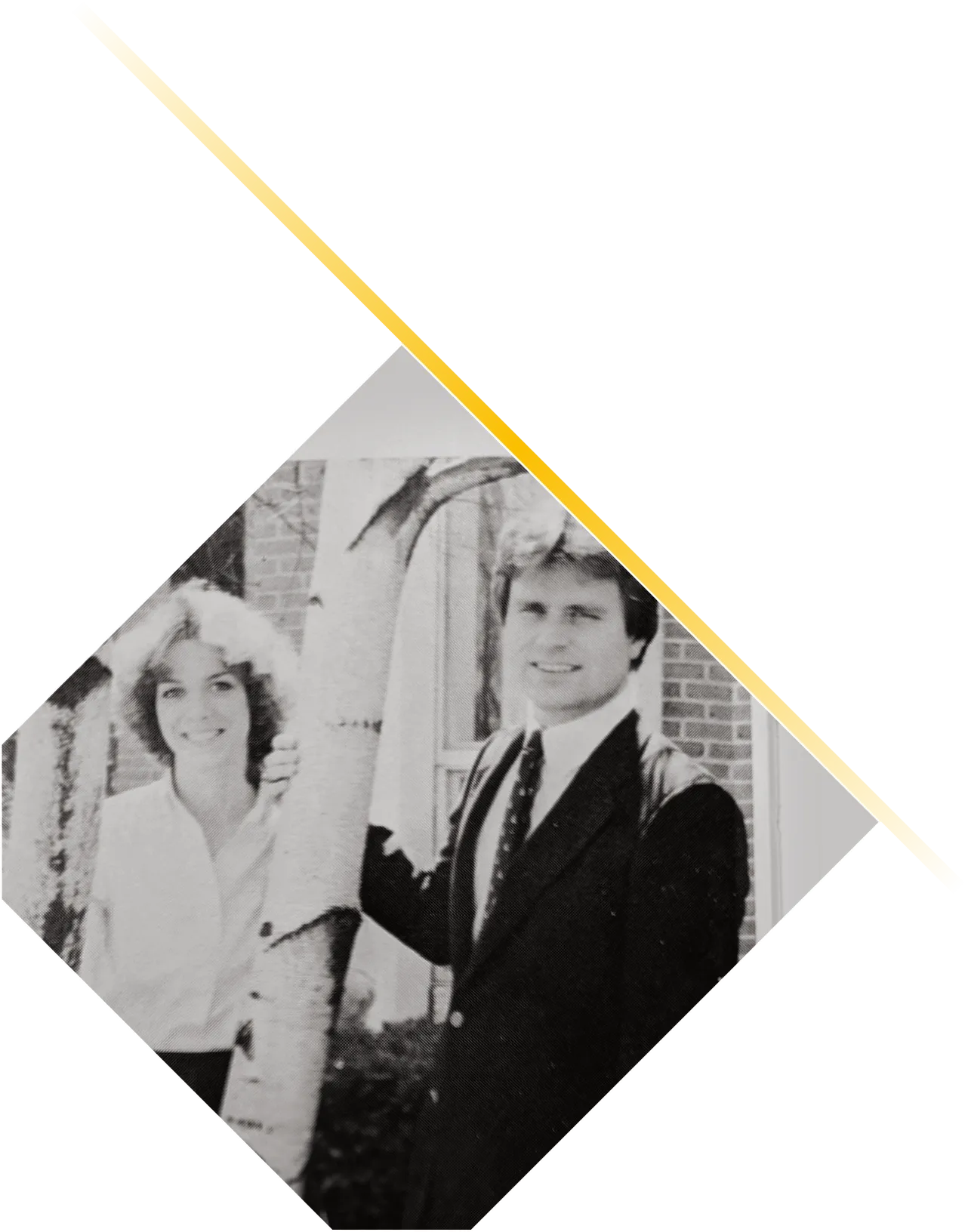
The thing that’s so different is how the University has really developed into a cohesive campus. When I was a student, you could never walk from one end of the campus to the other without having to traverse the sidewalks of South Franklin Street or South River Street. There was no way you could walk directly through the heart of the campus to go anywhere. For the benefit of our students, Wilkes has become a beautiful urban campus. It’s like a park. For young people who arrive here today, it’s always been that way. But for those of us who were here decades ago, it was a very different experience.
Whether it’s 30 years ago or today, I think that being a student athlete still teaches a lot of life lessons, including teamwork, perseverance, task management, wellness, being committed to something bigger than yourself. That has transcended the generations. Our portfolio of programs has expanded to 23 now, with over 500 student athletes. More than 25 percent of Wilkes students are participating in some kind of intercollegiate activity.
It’s hard thinking back over my tenure here to pick a single moment in athletics as a favorite. The Final Four run in men’s basketball in the late Nineties ranks high. Wilkes also has had such a great record in tennis over the last 15 years. Any time a Wilkes team wins a championship, it’s a great moment. And you know, having been a member of the football team, I’ve probably watched more games from that hill than anyone has over 43 years of being at Wilkes. All great moments.
I’ve known six of the University’s seven presidents and worked for five of them. Anytime there’s been a leadership change, you have to view that as a milestone for Wilkes and an opportunity for the University to shift its focus. Each president was selected for what they were going to bring to the University. With each president came a new iteration of the strategic plan and with that, the capital campaign to fund the projects that were associated with that plan. Those are always milestones in the development of the University. Whether it was a new gymnasium, or the Cohen Science Center, or the Henry Student Center or the Ralston Athletic Complex, all those things were part of bigger planning processes that led to another iteration of Wilkes. All were milestones.
In terms of highlights across my career, the two Middle States (accreditation) self-studies that I co-chaired—one with Ming Lew (associate professor of mathematics) and the other with Debbie Tindell (professor of psychology)—were two very proud moments for me. Each one of those is a process that is years in the making. Being able to move the University and continue to sustain its accreditation: those are two very proud moments for me.
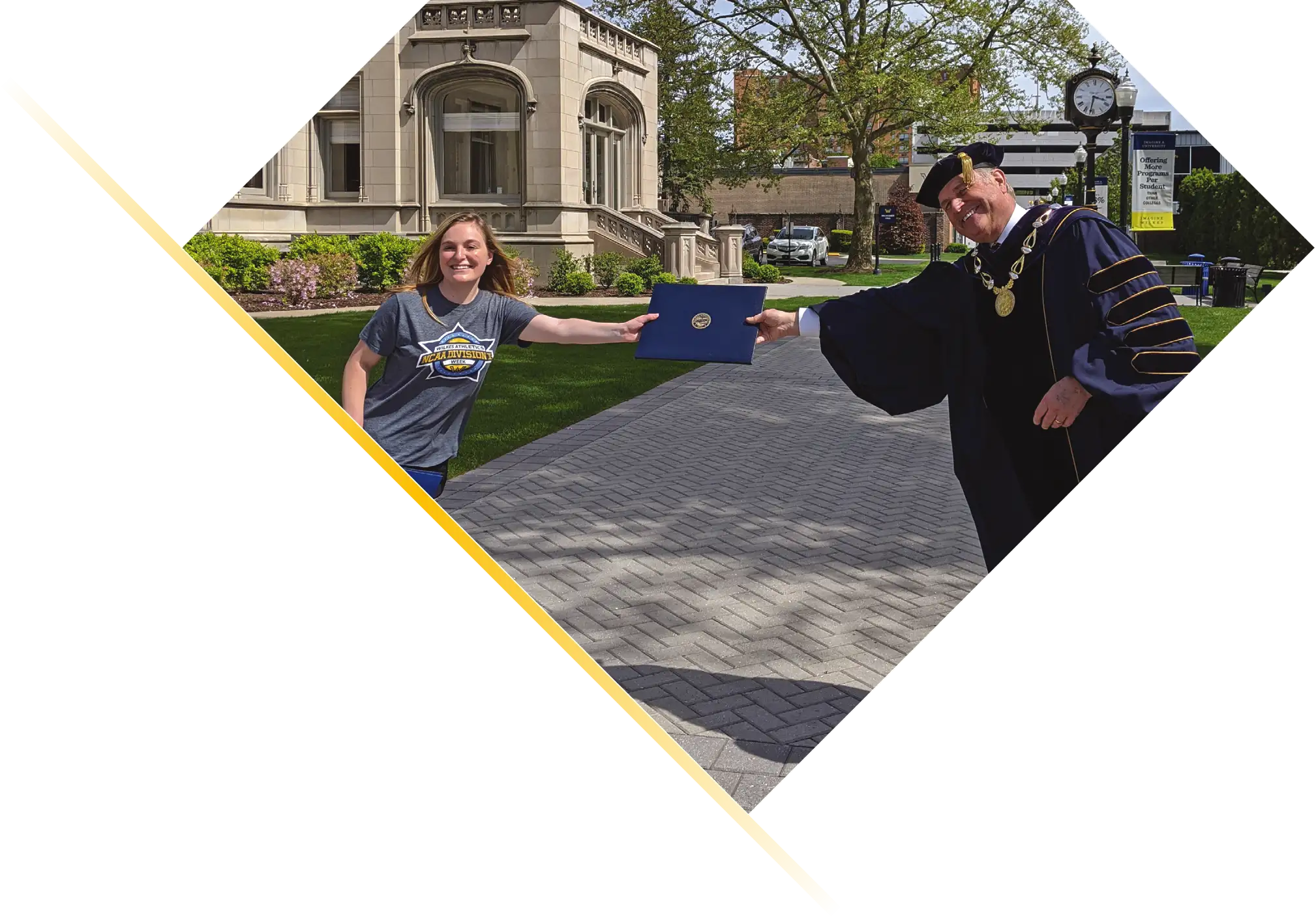

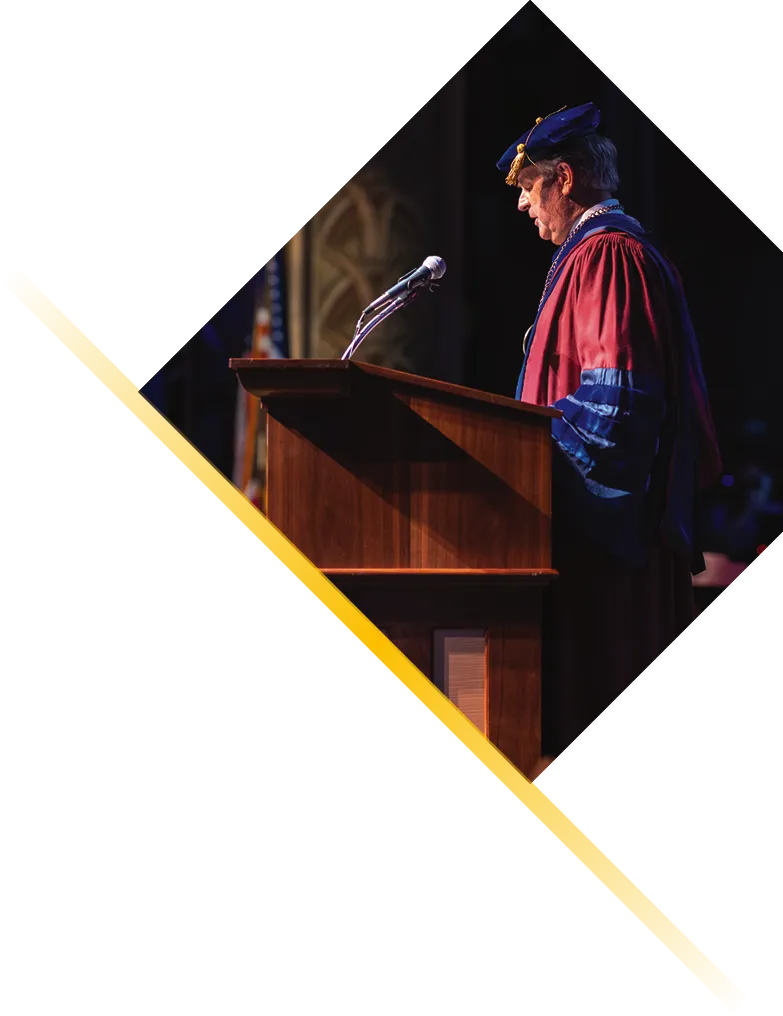
The pandemic will certainly go down as the most consequential of any event I was responsible for at Wilkes—and I just happened to be in the president’s role when it happened. None of us knew in March 2020 what was ahead of us. Thankfully, it evolved in increments that were manageable. I tried to rise to the occasion and respond in the very best way with the resources we had available. First and foremost, our obligation was to keep everybody safe. And then we had to think about how we were going to continue to deliver our academic programs. That was clearly our obligation and our responsibility to our students.
The pandemic decision about whether to send the 90-plus Panamanian students home was one of the most challenging decisions I made as president. We chose to keep them here and support them. We weren’t sure at that point how infectious this disease was going to be. We knew so little at that point. We knew that if we kept them here, they were our responsibility and if they got sick, they also were our responsibility. I just remember agonizing over that. Obviously, we decided to keep them here. And thankfully, it all worked.
And of course, nothing was as heartbreaking for us than the impact of the pandemic on seniors and their families in their last semester in 2020. Our graduating students had worked so hard and life-altering events beyond their control took their last semester and events like Senior Week and commencement away from them. I always thought of the pandemic as another Dr. Mike (former President Francis Michelini) moment. “We’re all in this boat together” was his great catchphrase during the Agnes flood. And knowing that Wilkes came out of that flood successfully gave me confidence that we were going to do it the same way in the pandemic.
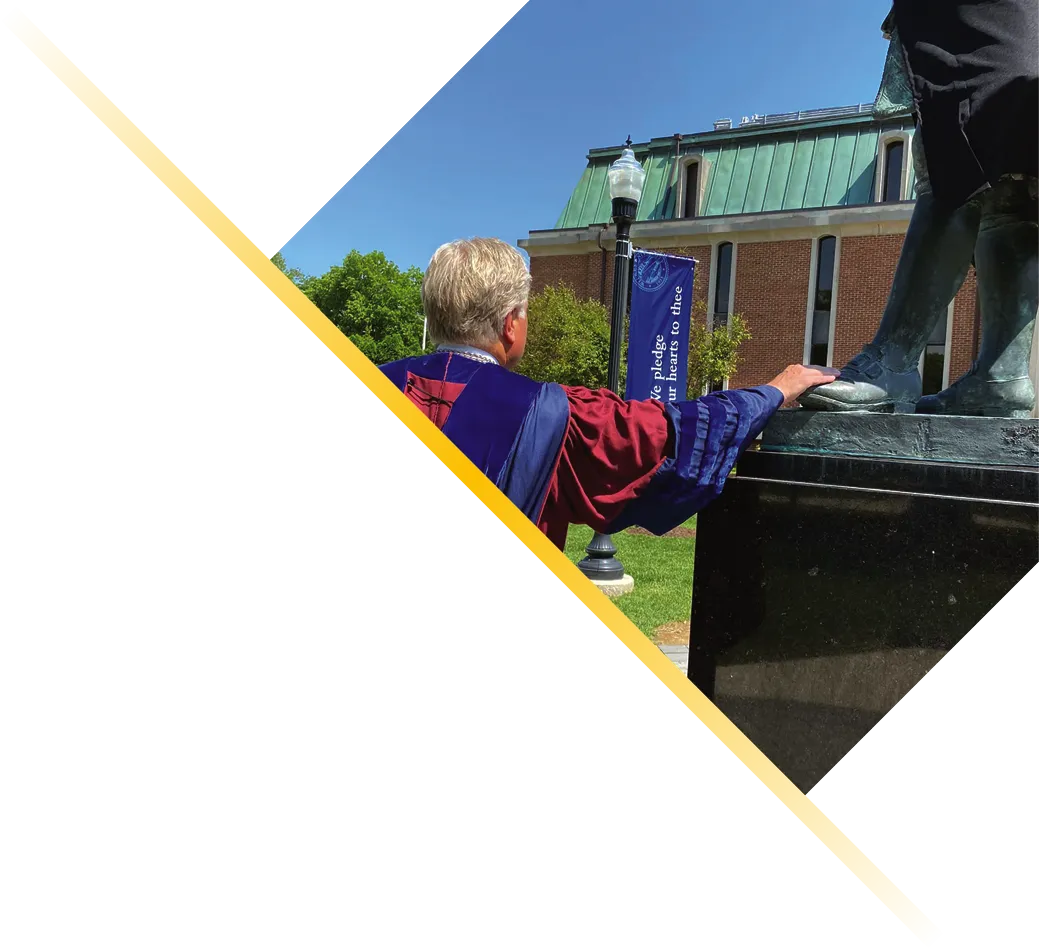
Below: Adams celebrates with Bob Bruggeworth ’83 and the men’s soccer team as they ring the Bruggeworth Victory Bell after the dedication of Bruggeworth Field in 2019.
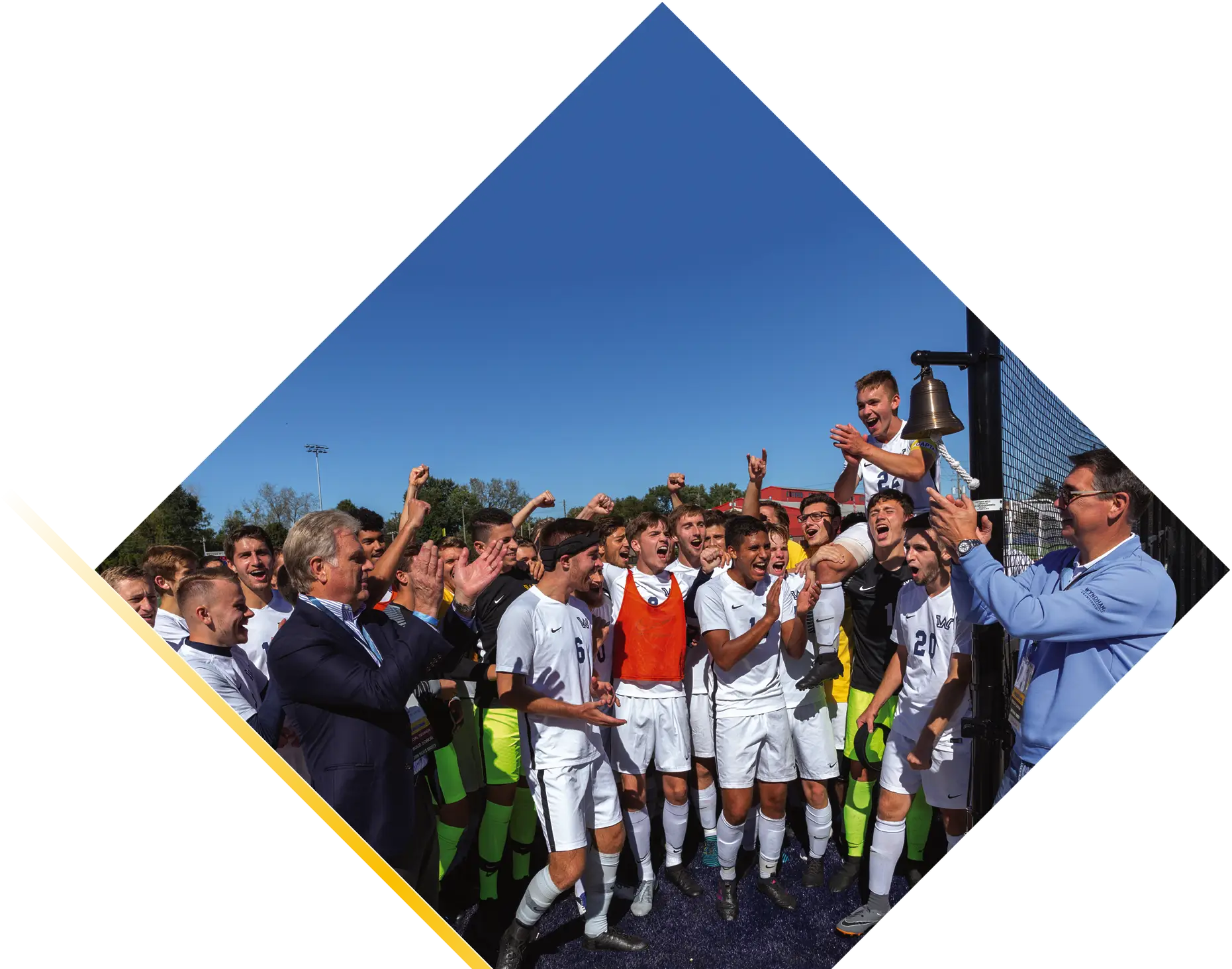
There is no greater honor than being able to stand on the stage and hand a diploma to a student on behalf of my colleagues. Greg (Cant, University president) let me do that for the Class of 2020, when it should have been his role. When you think about all that is represented in that diploma: all the work of the students, the sacrifices of their families, and the work and dedication of our faculty and staff. All of that is wrapped up in that diploma. To be the one who gets to hand that to the graduate—that was the ultimate moment for me.
One of the things I’m most proud of was figuring out how to have the ceremony on campus in what is now the Simms Center. (Note: Commencement had been held off-campus at the Mohegan Sun Arena for several years prior.) Commencement is the biggest and best celebration we do every year. And it’s the most important one, because it recognizes the success, accomplishment, and dedication of students and their families. What better thing to celebrate? You know, I’ve been through scores of commencements over those 25 years, but you need to remember that, for that student in that family, it’s a one-time experience, so it’s important to make it as special as you can. That’s their last memory of Wilkes, so I think that’s why it was so important to bring commencement back on campus so that their last memory was gathering with their family and friends on the Gateway, snapping pictures and meeting their professors.
I would want to have carried on the values and lessons of George Ralston (late dean of students for whom the Ralston Athletic Complex is named). No one in the life of Wilkes has done more to create the culture and place an emphasis on the individual person than he did. He set the tone early on about what it is to care for the young people who are on this campus, how we need to go the extra mile in support of their educations, and to make sure, if they need, a second or third chance, that they get it. I always felt that the greatest obligation that I had was to carry on his legacy, and make sure that each subsequent generation that attended Wilkes would benefit from his ethic of care, his wisdom and his benevolence. That would be the legacy that I would have. I want to feel that I’ve made a positive difference in the lives of young people and that I proved to be a good colleague.